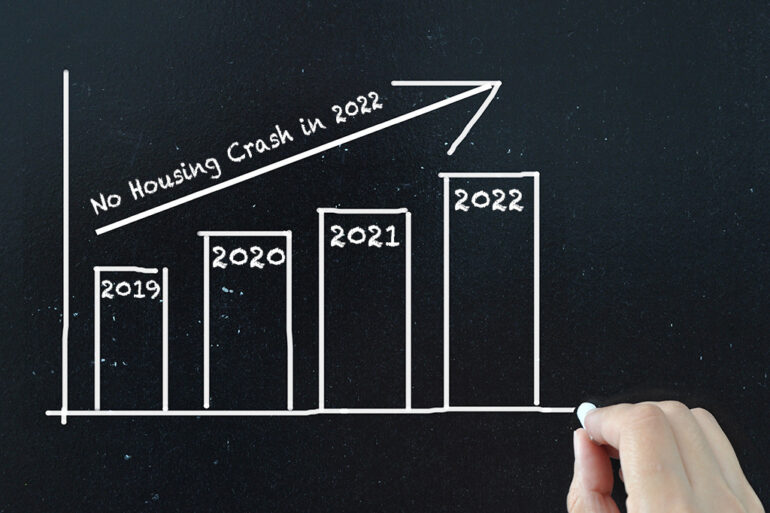Why the Housing Market Won’t Crash in 2022
Many people are still concerned about the prospect of a housing market collapse over the horizon. None of us have a crystal ball to predict the future (if only we had that crystal ball back in 2019), but based on current and past trends, it seems unlikely that the housing market will crash in 2022. It mainly comes down to a supply and demand imbalance.
In fact, some industry watchers predict that home prices will begin to rise slowly moving forward into 2022, which is needed at this point. Let’s look at some of the reasons why the housing market won’t crash in 2022.
What Is a Housing Market Crash?
A real estate crash or collapse usually follows the trend of a steep increase in prices. This price growth is oftentimes driven by a strong demand for homes, with the speculation that the demand will keep growing.
Developers and builders increase their production to meet the growing demand, and more homes are then built. At some point in time, demand begins to decline while the supply still rises. This leads to a steep drop in home values.
A real estate correction is a relatively minor drop in the market. Corrections happen more frequently than a crash. A market is in correction territory when the home price index falls not more than 10% from the highest price within a year.
As of spring 2021, we are not even close to the above scenario. The housing market inventory remains very low nationwide, but the demand from homebuyers, whether first-time buyers or investors, continues to soar all over the country. Low mortgage rates have helped to increase demand among buyers when supply is seriously diminished.
It is true that there have been trends of bidding wars, offers above listing price, and paying the difference if the appraisal comes in slightly lower, but the supply side does not reflect a crash in 2022. We currently have too little supply relative to demand. In most real estate markets across the US, there aren’t enough homes to satisfy the demand.
During the pandemic, people have been largely undeterred by the market boom, and the market has gone from strength to strength in 2021. However, there are some homeowners who just don’t want to sell their homes. They may feel they don’t want more change since the pandemic has impacted people’s lives and routines significantly.
This has suppressed inventory in the real estate market, creating a bigger demand for houses. Those homeowners who are moving are leaving urban areas for the suburbs now that they can work remotely.
2021 Trends and 2022 Predictions
In March this year, the property data and analytics company CoreLogic published a housing market report that focused on prices.
“Nationally, home price increased 10.4% in February 2021, compared with February 2020. Home prices are projected to increase 3.2% by February 2022.”
The 10.4% gain over the past year is much higher than the average annual home value increase going back over 40 years. It is an unsustainable level of price growth and exceeds wage and earnings growth. Prices can’t grow at that pace forever, and eventually values will level off as more buyers get priced out of the market.
CoreLogic’s long-term forecast alluding to a 3.2% price growth in 2022 is a more sensible level of appreciation. CoreLogic predicts a return to normalcy in 2022, not a crash in 2022.
In April 2021, Zillow issued the following statement: “United States home values have gone up 10.6% over the past year and Zillow predicts they will rise 10.4% in the next year.”
Another positive sign that the housing market won’t crash in 2022 is that mortgage delinquencies have declined month after month since August of 2020. According to Frank Martell, CEO and president of CoreLogic, “This is a good sign, and considering the improving picture regarding the pandemic and climbing employment rates, we are looking at the potential for a strong year of recovery.”
Since the housing crash of 2008, foreclosures and mortgage delinquencies have been growing exponentially across the US. Mortgage lenders have not been offering some of the high-risk mortgage products that were introduced during the early 2000s.
Moving into this decade, some restrictions have been loosened, and there are some good mortgage products on the market, including Federal Housing Administration (FHA) loans. If you qualify (first-time buyers only), these loans require just a down payment of 3.5% to purchase a single-family home, which is considerably less than the 20% down payment normally required for a conventional loan.
Also worth mentioning is that real estate markets can vary widely from one state to another. According to the Boca Raton Elliman Report Q1 2021, median sales prices for single-family homes in Florida rose by 19.9%, sales closed by 28%, and inventory is down by a whopping 67.9%! This part of the US, which is in the luxury market arena, may be somewhat of an anomaly, though.
Builders Have Learned from the 2008 Housing Crash
There is a different kind of real estate boom this time with no sign of a crash in 2022. The crash of 2008 was brought about by a combination of overbuilding, builder speculation, and reckless mortgage lending practices.
Lenders gave out mortgages to people as if they were candies in a candy store, which in turn caused a steep rise in construction, especially in Pheonix and Las Vegas. Developers and builders have hopefully learned from their past mistakes and have not been overbuilding in the past decade.
Jeffrey Mezger, CEO of KB Home, told CNN Business that the company has been “underbuilding for the last 15 years.”
A recent analysis from the research team at Freddie Mac states that there is a shortage of 3.8 million homes to meet the demand from buyers nationwide. Sam Khater, chief economist at Freddie Mac, says “We should have almost four million more housing units if we had kept up with demand the last few years. This is what you get when you underbuild for ten years.”
In April 2021, a report from Realtor.com stated “Although the trend of sellers putting their home on the market improved slightly from February, 20% fewer homes were listed for sale in March 2021 than a year ago.”
About 4.8 million millennials are turning 30 in 2020 and will continue to do so for the next three years, which is a significant and positive indicator for the economy and housing market. With the COVID-19 vaccine gaining momentum and the economy coming back strong, millions of households could be potential homebuyers in 2022, which indicates the housing market won’t crash in 2022.
Mortgage rates are expected to remain near borrower-friendly levels, which will help maintain a strong housing demand. With the continuing supply-demand imbalance, the upward pull on prices is expected to remain consistent through 2022 and beyond.








